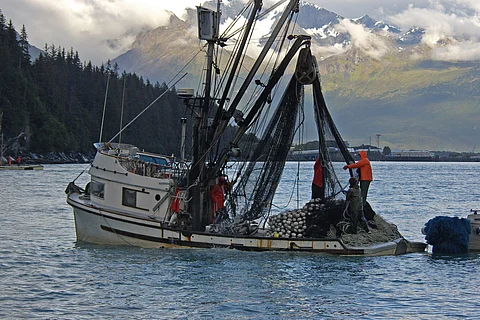

The Improving Agriculture, Research, Cultivation, Timber, and Indigenous Commodities (ARCTIC) Act "will strengthen a variety of Farm Bill provisions to better address needs in Alaska." So says the office of U.S. Senator Murkowski (R-Alaska), which seeks to support both production and access to healthy foods for Alaskans. Of all the industries included in Murkowski's proposal, Alaska's seafood industry gets the most attention with up to 8 proposed improvements aimed at expanding and refining USDA's vision for seafood.
"Over the past year, in preparation for the 2023 Farm Bill, my team and I have been working diligently with Alaskan stakeholders to learn more about their concerns, priorities, and goals," said Senator Lisa Murkowski as presenting the proposal. "Following our hard work and Alaskans' generous input, I'm proud to unveil the 'Improving ARCTIC Act', a measure that is truly a win for Alaska in this year's Farm Bill."
Every five years, the U.S. 'Farm Bill' addresses a variety of agricultural and food programs over a dozen titles covering support for commodity and specialty crops and floriculture, conservation, agricultural trade and research, nutrition assistance for low-income Americans, farm support programs, rural development, or forestry. As mentioned, Murkowski stated that he is introducing this 'Improving ARCTIC Act' aims "to secure wins for Alaska in the Farm Bill," which includes to strengthen Alaska's seafood industry.
"By helping more Alaskans access healthy foods; supporting Alaska's farmers and our seafood, floriculture, and forestry industries; addressing low-income Alaskans' housing needs; and expanding Tribal self-governance, my 'Improving ARCTIC Act' focuses on Alaskan's priorities, and will work to make our communities healthier. I look forward to including these important provisions within this year's Farm Bill," she stated.
Regarding the seafood industry exclusively, these are the eight points emphasized in the 'Improving ARCTIC Act' promoted by Senator Murkowski:
The measures included in the 'Improving ARCTIC Act' have been welcomed among Alaska's seafood industry leaders. However, differences in the sensitivities of the various associations on issues such as mariculture, for example, have been evident in the statements.
"This bill represents the kind of holistic approach we need to promote our responsibly-managed domestic seafood industry with a more level-playing field in the market, support continued work towards 100% utilization in the seafood industry, and explore new opportunities for sustainable economic development in our coastal communities," said Julie Decker, Executive Director of Alaska Fisheries Development Foundation.
"We applaud Senator Murkowski's work to expand and sharpen USDA's vision when it comes to seafood. The seafood provisions in the 'Improving ARCTIC Act' will help consumers differentiate between wild harvested seafood and genetically engineered or lab-grown seafood; the provisions also prevent the federal government from imposing off-shore aquaculture on States such as Alaska that have wisely protected wild fish stocks from the impacts of this damaging industry," stated for her part Linda Behnken, Alaska Longline Fishermen's Association.
"Southeast Conference is leading a statewide effort to grow mariculture into a $100 million a year industry in the next 10 years," said its Executive Director, Robert Venables. "This bill recognizes the historical and traditional uses of Alaska Natives and provides a multifaceted approach to support and incentivize these efforts to create jobs and wealth that have a primary focus on Indigenous and Underserved Communities' goals for a sustainable mariculture industry."
"The seafood provisions in Senator Murkowski's Improving ARCTIC Act elevate many of the priorities of fishermen and the seafood industry. Provisions such as establishing a USDA label for wild seafood harvested in U.S. waters and including 'cooked crab' as a covered commodity in the USDA Country-of-Origin Labeling (COOL) Program provide assurance to the consumer that the product they are purchasing has been sustainably harvested by American fishermen," highlighted Tracy Welch, Executive Director of United Fishermen of Alaska (UFA).
Finally, the Alaska Seafood Marketing Institute (ASMI) thanked Senator Murkowski's long history of ensuring Alaska's fishermen and seafood industry have equal access to USDA programs and fair competition in the U.S. market. "Senator Murkowski's 'Improving ARCTIC Act' will provide consumers critical information on the origin of their seafood, as well as help Alaska fishermen, fishing communities, and its seafood industry prosper as they develop a sustainable resource critical to Alaska's economy," concluded Jeremy Woodrow, ASMI Executive Director.
This is not the first time Senator Murkowski has openly shown her support for the seafood industry in Alaska. She previously did it by asking for a federal disaster declaration for crab fisheries; she did it by proposing a bill to increase funding for fisheries in rural communities; and she also did it together with Senator Sullivan by requesting the creation of the aforementioned 'Wild USA Seafood' label.
